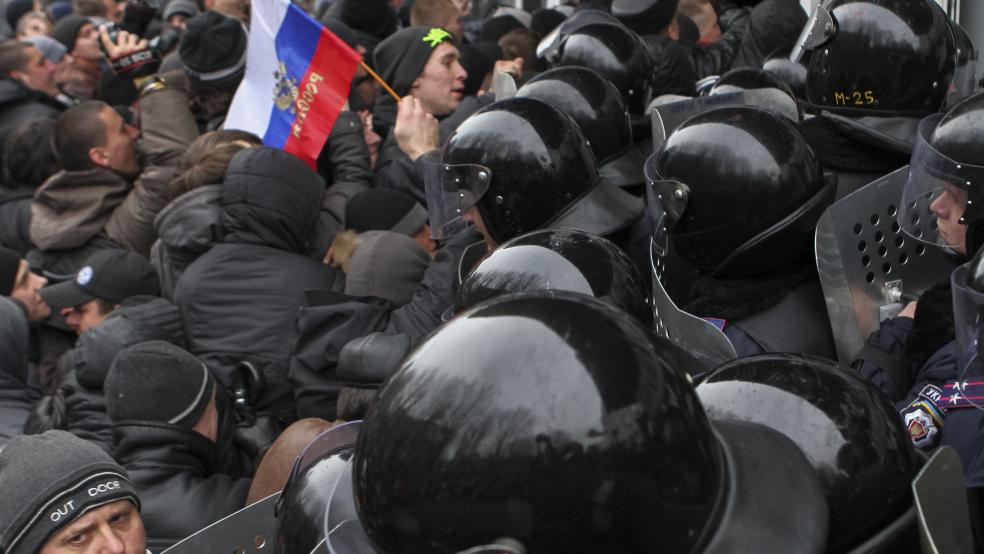The fast-moving story in the Ukraine became more complicated over the weekend, as Russian forces appeared to take control of a natural gas pumping facility outside the regional borders of the Crimea, and Crimean voters took part in a referendum on joining the Russian Federation that was widely criticized as a sham by other governments around the world.
On the Sunday morning news talk shows, U.S. officials from both Congress and the executive branch repeated their now weeks-old call for tough sanctions against Russia, but had to concede that nothing will get through Congress until it returns from its most recent recess more than a week from now.
Related: Putin’s Oligarchs Are Key to War and Peace in Ukraine
On CBS’ Face the Nation, host Bob Scheiffer suggested that there might have been slight movement on the part of the Russian government toward a diplomatic solution to the crisis. The Russian foreign ministry, he reported, issued a statement saying that foreign minister Sergey Lavrov, in conversations with U.S. Secretary of State John Kerry, had agreed “to seek resolution to the Ukrainian crisis thorough constitutional reform in Ukraine.”
However, the idea that Russia would consider rolling back its invasion of the Crimean peninsula seemed far-fetched, and some suggested it was simply a means of buying time to allow the referendum to be completed.
“We’ve seen this movie before,” House Intelligence Committee Chairman Mike Rogers (R-MI) told Schieffer. “We should be cautious. I want to know exactly what was offered in exchange.”
The conversations between Kerry and Lavrov have been ongoing for weeks, but the most recent came less than two days after the U.S. Congress recessed without passing any bills that would either assist the Ukrainian government or impose sanctions on Russia. A bipartisan bill that passed the Senate Foreign Relations Committee by a vote of 14-3 was filibustered by Republicans who objected to its treatment of the International Monetary Fund, and who wanted to add unrelated measures to the bill.
Related: IMF Now Divides Congress Over Support of Ukraine
Speaking on NBC’s Meet the Press, senior White House advisor Dan Pfeiffer said that to the extent it can, the administration will act unilaterally on some sanctions. Pfeiffer told host David Gregory, “You can expect sanction designations in the coming days,” and added, “Supporting the new Ukrainian government in every way possible is at the top of our priority list.”
The report that Russian soldiers, backed by helicopters and armored vehicles, had moved beyond the Crimea’s regional border seemed to signal a new phase in the conflict – which has so far not involved direct combat between Russian and Ukrainian troops.
“We do see it as a provocation and one of those many provocations that Russians are trying to organize on the territory of Ukraine,” Andrii Deshchytsia, Ukraine’s acting foreign minister, said on ABC’s This Week with George Stephanopolous. “We will not go for provocation since we want to go for a peaceful solution of this crisis.”
Deshchytsia conceded that Russia would have a sizeable advantage if the situation devolves into outright combat. “Look, if you compare the military arsenals of Ukraine and Russia, of course the Russians’ positions are much better,” he said. They have “overwhelming positions and strength.”
Related: Russian Ties to Ukraine Go Much Deeper than Gas
However, on the same show, Sen. Chris Murphy (D-CT), who recently returned from a trip to Ukraine, did not rule out the potential for armed conflict. “The Ukrainians are not going to go down without a fight,” he said. “If Russia really does decide to move beyond Crimea it will be bloody and the fight may be long and they need help from the United States.”
There was much discussion of whether U.S.-Russian relations are hardening into a new “Cold War” type stance – something a number of officials tried to dismiss.
“The United States of America has to have a fundamental reassessment of our relationship with Vladimir Putin,” said Arizona Sen. John McCain on CNN’s State of the Union. “No more reset buttons. No more ‘Tell Vladimir I’ll be more flexible.’ Treat him for what he is. That does not mean re-ignition of the cold war, but it does mean treating him in the way that we understand [he is] an individual who believes in reinstating the old Russian empire.”
On Face the Nation, former Obama National Security Advisor Tom Donilon brushed off the idea that the U.S. and Russia are embarking on another Cold War. The real Cold War, he said, was a global contest between two superpowers, each of which represented a truly existential threat to the other.
Russia today, he said “is not anywhere near” the international power it was before the Soviet Union broke apart
Top Reads from The Fiscal Times:





